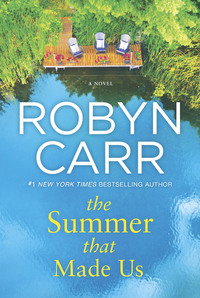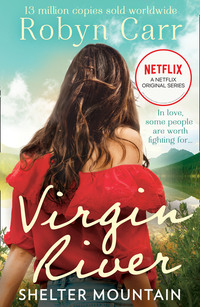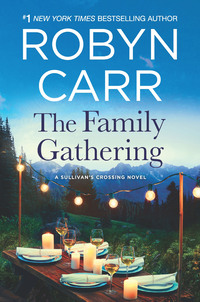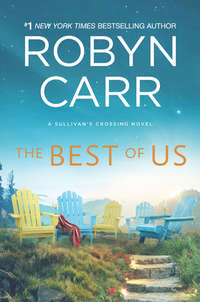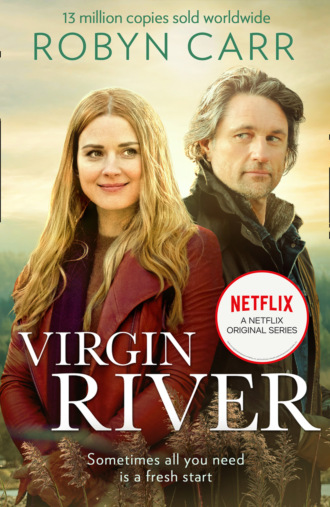
Полная версия
A Virgin River Novel

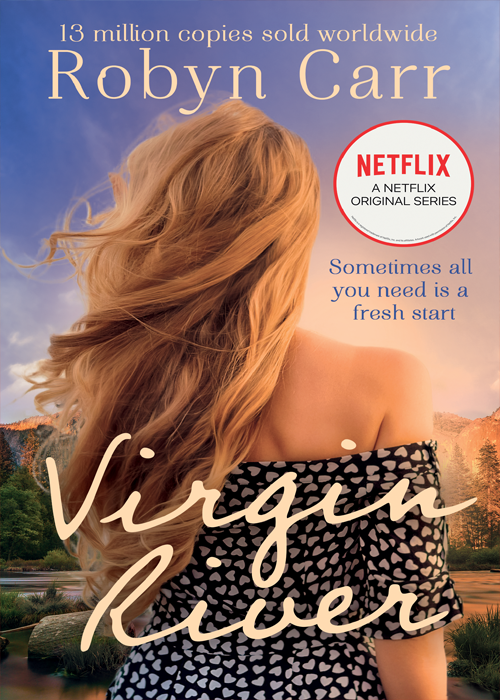
Robyn Carr is a RITA® Award-winning, #1 New York Times bestselling author of more than fifty novels, including the critically acclaimed Virgin River and Thunder Point series, as well as highly praised women’s fiction such as Four Friends. Robyn and her husband live in Las Vegas, Nevada. You can visit Robyn Carr’s website at robyncarr.com
Also available from Robyn Carr
Sullivan's Crossing
What We Find
The Family Gathering
The Best of Us
Virgin River
VIRGIN RIVER
SHELTER MOUNTAIN
WHISPERING ROCK
A VIRGIN RIVER CHRISTMAS
SECOND CHANCE PASS
TEMPTATION RIDGE
PARADISE VALLEY
FORBIDDEN FALLS
ANGEL’S PEAK
MOONLIGHT ROAD
PROMISE CANYON
WILD MAN CREEK
HARVEST MOON
BRING ME HOME FOR CHRISTMAS
HIDDEN SUMMIT
REDWOOD BEND
SUNRISE POINT
MY KIND OF CHRISTMAS
VIRGIN
RIVER
ROBYN CARR

www.millsandboon.co.uk
ISBN: 978-1-408-93571-2
Virgin River
© Robyn Carr 2007
Published in Great Britain 2019.
by Mills & Boon, an imprint of HarperCollinsPublishers 1,
London Bridge Street, London, SE1 9GF
All rights reserved including the right of reproduction in whole or in part in any form. This edition is published by arrangement with Harlequin Books S.A.
This is a work of fiction. Names, characters, places, locations and incidents are purely fictional and bear no relationship to any real life individuals, living or dead, or to any actual places, business establishments, locations, events or incidents. Any resemblance is entirely coincidental.
By payment of the required fees, you are granted the non-exclusive, non-transferable right and licence to download and install this e-book on your personal computer, tablet computer, smart phone or other electronic reading device only (each a “Licensed Device”) and to access, display and read the text of this e-book on-screen on your Licensed Device. Except to the extent any of these acts shall be permitted pursuant to any mandatory provision of applicable law but no further, no part of this e-book or its text or images may be reproduced, transmitted, distributed, translated, converted or adapted for use on another file format, communicated to the public, downloaded, decompiled, reverse engineered, or stored in or introduced into any information storage and retrieval system, in any form or by any means, whether electronic or mechanical, now known or hereinafter invented, without the express written permission of publisher.
® and ™ are trademarks owned and used by the trademark owner and/or its licensee. Trademarks marked with ® are registered with the United Kingdom Patent Office and/or the Office for Harmonisation in the Internal Market and in other countries.
Version: 2020-03-02
MILLS & BOON
Before you start reading, why not sign up?
Thank you for downloading this Mills & Boon book. If you want to hear about exclusive discounts, special offers and competitions, sign up to our email newsletter today!
SIGN ME UP!
Or simply visit
signup.millsandboon.co.uk
Mills & Boon emails are completely free to receive and you can unsubscribe at any time via the link in any email we send you.
PRAISE FOR #1 NEW YORK TIMES BESTSELLING AUTHOR ROBYN CARR
‘The Virgin River books are so compelling—I connected instantly with the characters and just wanted more and more and more.’
—#1 New York Times bestselling author Debbie Macomber
Insightfully realized central figures, a strong supporting cast, family issues, and uncommon emotional complexity make this uplifting story a heart-grabber that won’t let readers go until the very end... A rewarding (happy) story that will appeal across the board and might require a hanky or two.’
—Library Journal
‘Robyn Carr has done it again... What We Find is complex, inspirational, and well-written. A romance that truly inspires readers as life hits them the hardest.’ —San Francisco Review Journal
'With this tale of the soothing splendour of the land and our vulnerability, Carr sets the bar for contemporary romance. The well-paced plot, engaging and well-defined characters, and an inviting setting make Carr's latest an enhancement not only to the romance shelves but to any fiction collection.'
—Booklist
‘A satisfying reinvention story that handles painful issues with a light and uplifting touch.’
—Kirkus Reviews on The Life She Wants
Carr’s new novel demonstrates that classic women’s fiction, illuminating the power of women’s friendships, is still alive and well.’
—Booklist on Four Friends
‘A thought-provoking look at women…and the choices they make.’
—Kirkus Reviews on Four Friends
This novel is dedicated to Pam Glenn, Goddess of Midwifery, my friend and sister of my heart.
ACKNOWLEDGMENTS
Thanks to Pamela SF Glenn, CNM, MS—without whose expertise in midwifery, this story would not have been possible. My deepest gratitude for poring over manuscript after manuscript with sharp eyes and a ruthless pen, keeping me straight. And to Sharon Lampert, RN, WHNP, for sharing her expertise as a women’s health nurse practitioner, but mostly for picking up your cell phone no matter where you were and answering delicate questions about female anatomy and function with directness and honesty. I’m sure there are people out there still talking about what they overheard in the grocery store, beauty parlor and Department of Motor Vehicles. The passion and devotion with which you two professionals serve your women patients is inspiring, and was an enormous help in shaping the character of a dedicated nurse practitioner and certified nurse midwife.
Thanks to Paul Wojcik for sharing your experiences in the United States Marine Corps, and to Richard Gustavson, RN, with twenty-three years in the Navy Reserves. I thank each of you for reading the manuscripts and for offering your invaluable technical input.
Kris Kitna, Chief of Police, Fortuna, California, thanks for valuable information on local law enforcement, not to mention help with details about hunting, fishing and firearms.
Kate Bandy, the best assistant a writer can possibly have, my dear friend of many years, thanks not only for reading copy and offering suggestions, but especially for accompanying me on an exciting research trip to Humboldt County. Without you there I would have floundered…or slipped off a mountain.
Denise and Jeff Nicholl—thanks for reading first drafts, taking exhaustive notes and answering a million questions. Your friendship and support during the whole process mean the world to me. Many thanks to Nellie Valdez-Hathorn for her help with my Spanish.
Other early readers whose input was critical included Jamie Carr, Laurie Fait, Karen Garris, Martha Gould, Pat Hagee, Goldiene Jones and Lori Stoveken—I’m deeply in debt to you for your comments and suggestions.
Huge thanks to Clive Cussler, Debbie Macomber and Carla Neggers for reading and commenting on Virgin River. To take the time, with your busy schedules, is a monumental compliment.
Huge thanks to Valerie Gray, my editor, and Liza Dawson, my agent, for your commitment to helping me craft the best series possible. Your hard work and dedication made all the difference—I’m so grateful.
To Trudy Casey, Tom Fay, Michelle Mazzanti, Kristy Price and the entire staff of Henderson Public Libraries, thank you for the monumental support and encouragement. I’ve never known a more hardworking and motivated group of public servants.
And finally, thanks to Jim Carr for your loving support. And my God, thank you for cooking! I wish I’d known years ago that you could!
One
Mel squinted into the rain and darkness, creeping along the narrow, twisting, muddy, tree-enshrouded road and for the hundredth time thought, am I out of my mind? And then she heard and felt a thump as the right rear wheel of her BMW slipped off the road onto the shoulder and sank into the mud. The car rocked to a stop. She accelerated and heard the wheel spin but she was going nowhere fast.
I am so screwed, was her next thought.
She turned on the dome light and looked at her cell phone. She’d lost the signal an hour ago when she left the freeway and headed up into the mountains. In fact, she’d been having a pretty lively discussion with her sister Joey when the steep hills and unbelievably tall trees blocked the signal and cut them off.
“I cannot believe you’re really doing this,” Joey was saying. “I thought you’d come to your senses. This isn’t you, Mel! You’re not a small-town girl!”
“Yeah? Well, it looks like I’m gonna be—I took the job and sold everything, so I wouldn’t be tempted to go back.”
“You couldn’t just take a leave of absence? Maybe go to a small, private hospital? Try to think this through?”
“I need everything to be different,” Mel said. “No more hospital war zone. I’m just guessing, but I imagine I won’t be called on to deliver a lot of crack babies out here in the woods. The woman said this place, this Virgin River, is calm and quiet and safe.”
“And stuck back in the forest, a million miles from a Starbucks, where you’ll get paid in eggs and pig’s feet and—”
“And none of my patients will be brought in handcuffed, guarded by a corrections officer.” Then Mel took a breath and, unexpectedly, laughed and said, “Pig’s feet? Oh-oh, Joey—I’m going up into the trees again, I might lose you…”
“You wait. You’ll be sorry. You’ll regret this. This is crazy and impetuous and—”
That’s when the signal, blessedly, was lost. And Joey was right—with every additional mile, Mel was doubting herself and her decision to escape into the country.
At every curve the roads had become narrower and the rain a little harder. It was only 6:00 p.m., but it was already dark as pitch; the trees were so dense and tall that even that last bit of afternoon sun had been blocked. Of course there were no lights of any kind along this winding stretch. According to the directions, she should be getting close to the house where she was to meet her new employer, but she didn’t dare get out of her swamped car and walk. She could get lost in these woods and never be seen again.
Instead, she fished the pictures from her briefcase in an attempt to remind herself of a few of the reasons why she had taken this job. She had pictures of a quaint little hamlet of clapboard houses with front porches and dormer windows, an old-fashioned schoolhouse, a steepled church, hollyhocks, rhododendrons and blossoming apple trees in full glory, not to mention the green pastures upon which livestock grazed. There was the Pie and Coffee shop, the Corner Store, a tiny-one-room, freestanding library, and the adorable little cabin in the woods that would be hers, rent free, for the year of her contract.
The town backed up to the amazing sequoia redwoods and national forests that spanned hundreds of miles of wilderness over the Trinity and Shasta mountain ranges. The Virgin River, after which the town was named, was deep, wide, long, and home to huge salmon, sturgeon, steel fish and trout. She’d looked on the Internet at pictures of that part of the world and was easily convinced no more beautiful land existed. Of course, she could see nothing now except rain, mud and darkness.
Ready to get out of Los Angeles, she had put her résumé with the Nurse’s Registry and one of the recruiters brought Virgin River to her attention. The town doctor, she said, was getting old and needed help. A woman from the town, Hope McCrea, was donating the cabin and the first year’s salary. The county was picking up the tab for liability insurance for at least a year to get a practitioner and midwife in this remote, rural part of the world. “I faxed Mrs. McCrea your résumé and letters of recommendation,” the recruiter had said, “and she wants you. Maybe you should go up there and look the place over.”
Mel took Mrs. McCrea’s phone number and called her that evening. Virgin River was far smaller than what she’d had in mind, but after no more than an hour-long conversation with Mrs. McCrea, Mel began effecting her move out of L.A. the very next morning. That was barely two weeks ago.
What they didn’t know at the Registry, nor in Virgin River for that matter, was that Mel had become desperate to get away. Far away. She’d been dreaming of a fresh start, and peace and quiet, for months. She couldn’t remember the last time she’d had a restful night’s sleep. The dangers of the big city, where crime seemed to be overrunning the neighborhoods, had begun to consume her. Just going to the bank and the store filled her with anxiety; danger seemed to be lurking everywhere. Her work in the three-thousand-bed county hospital and trauma center brought to her care the victims of too many crimes, not to mention the perpetrators of crimes hurt in pursuit or arrest— strapped to hospital beds in wards and in Emergency, guarded by cops. What was left of her spirit was hurting and wounded. And that was nothing to the loneliness of her empty bed.
Her friends begged her to stave off this impulse to run for some unknown small town, but she’d been in grief group, individual counseling and had seen more of the inside of a church in the last nine months than she had in the last ten years, and none of that was helping. The only thing that gave her any peace of mind was fantasizing about running away to some tiny place in the country where people didn’t have to lock their doors, and the only thing you had to fear were the deer getting in the vegetable garden. It seemed like sheer heaven.
But now, sitting in her car looking at the pictures by the dome light, she realized how ridiculous she’d been. Mrs. McCrea told her to pack only durable clothes— jeans and boots—for country medicine. So what had she packed? Her boots were Stuart Weitzmans, Cole Haans and Fryes—and she hadn’t minded paying over a tidy four-fifty for each pair. The jeans she had packed for traipsing out to the ranches and farms were Rock & Republics, Joe’s, Luckys, 7 For All Mankind—they rang up between one-fifty and two-fifty a copy. She’d been paying three hundred bucks a pop to have her hair trimmed and highlighted. After scrimping for years through college and post-grad nursing, once she was a nurse practitioner with a very good salary she discovered she loved nice things. She might have spent most of her workday in scrubs, but when she was out of them, she liked looking good.
She was sure the fish and deer would be very impressed.
In the past half hour she’d only seen one old truck on the road. Mrs. McCrea hadn’t prepared her for how perilous and steep these roads were, filled with hairpin turns and sharp drop-offs, so narrow in some places that it would be a challenge for two cars to pass each other. She was almost relieved when the dark consumed her, for she could at least see approaching headlights around each tight turn. Her car had sunk into the shoulder on the side of the road that was up against the hill and not the ledge where there were no guardrails. Here she sat, lost in the woods and doomed. With a sigh, she turned around and pulled her heavy coat from the top of one of the boxes on the backseat. She hoped Mrs. McCrea would be traversing this road either en route to or from the house where they were to meet. Otherwise, she would probably be spending the night in the car. She still had a couple of apples, some crackers and two cheese rounds in wax. But the damn Diet Coke was gone—she’d have the shakes and a headache by morning from caffeine withdrawal.
No Starbucks. She should have done a better job of stocking up.
She turned off the engine, but left the lights on in case a car came along the narrow road. If she wasn’t rescued, the battery would be dead by morning. She settled back and closed her eyes. A very familiar face drifted into her mind: Mark. Sometimes the longing to see him one more time, to talk to him for just a little while was overwhelming. Forget the grief—she just missed him—missed having a partner to depend on, to wait up for, to wake up beside. An argument over his long hours even seemed appealing. He told her once, “This—you and me—this is forever.”
Forever lasted four years. She was only thirty-two and from now on she would be alone. He was dead. And she was dead inside.
A sharp tapping on the car window got her attention and she had no idea if she’d actually been asleep or just musing. It was the butt of a flashlight that had made the noise and holding it was an old man. The scowl on his face was so jarring that she thought the end she feared might be upon her.
“Missy,” he was saying. “Missy, you’re stuck in the mud.”
She lowered her window and the mist wet her face. “I…I know. I hit a soft shoulder.”
“That piece of crap won’t do you much good around here,” he said.
Piece of crap indeed! It was a new BMW convertible, one of her many attempts to ease the ache of loneliness. “Well, no one told me that! But thank you very much for the insight.”
His thin white hair was plastered to his head and his bushy white eyebrows shot upwards in spikes; the rain glistened on his jacket and dripped off his big nose. “Sit tight, I’ll hook the chain around your bumper and pull you out. You going to the McCrea house?”
Well, that’s what she’d been after—a place where everyone knows everyone else. She wanted to warn him not to scratch the bumper but all she could do was stammer, “Y-yes.”
“It ain’t far. You can follow me after I pull you out.”
“Thanks,” she said.
So, she would have a bed after all. And if Mrs. McCrea had a heart, there would be something to eat and drink. She began to envision the glowing fire in the cottage with the sound of spattering rain on the roof as she hunkered down into a deep, soft bed with lovely linens and quilts wrapped around her. Safe. Secure. At last.
Her car groaned and strained and finally lurched out of the ditch and onto the road. The old man pulled her several feet until she was on solid ground, then he stopped to remove the chain. He tossed it into the back of the truck and motioned for her to follow him. No argument there—if she got stuck again, he’d be right there to pull her out. Along she went, right behind him, using lots of window cleaner with her wipers to keep the mud he splattered from completely obscuring her vision.
In less than five minutes, the blinker on the truck was flashing and she followed him as he made a right turn at a mailbox. The drive was short and bumpy, the road full of potholes, but it quickly opened up into a clearing. The truck made a wide circle in the clearing so he could leave again, which left Mel to pull right up to…a hovel!
This was no adorable little cottage. It was an A-frame with a porch all right, but it looked as though the porch was only attached on one side while the other end had broken away and listed downward. The shingles were black with rain and age and there was a board nailed over one of the windows. It was not lit within or without; there was no friendly curl of smoke coming from the chimney.
The pictures were lying on the seat beside her. She blasted on her horn and jumped immediately out of the car, clutching the pictures and pulling the hood of her wool jacket over her head. She ran to the truck. He rolled down his window and looked at her as if she had a screw loose. “Are you sure this is the McCrea cottage?”
“Yup.”
She showed him the picture of the cute little A-frame cottage with Adirondack chairs on the porch and hanging pots filled with colorful flowers decorating the front of the house. It was bathed in sunlight in the picture.
“Hmm,” he said. “Been awhile since she looked like that.”
“I wasn’t told that. She said I could have the house rent free for a year, plus salary. I’m supposed to help out the doctor in this town. But this—?”
“Didn’t know the doc needed help. He didn’t hire you, did he?” he asked.
“No. I was told he was getting too old to keep up with the demands of the town and they needed another doctor, but that I’d do for a year or so.”
“Do what?”
She raised her voice to be heard above the rain. “I’m a nurse practitioner. And certified nurse midwife.”
That seemed to amuse him. “That a fact?”
“You know the doctor?” she asked.
“Everybody knows everybody. Seems like you shoulda come up here and look the place over and meet the doc before making up your mind.”
“Yeah, seems like,” she said in some self-recrimination. “Let me get my purse—give you some money for pulling me out of the—” But he was already waving her off.
“Don’t want your money. People up here don’t have money to be throwing around for neighborly help. So,” he said with humor, lifting one of those wild white eyebrows, “looks like she got one over on you. That place’s been empty for years now.” He chuckled. “Rent free! Hah!”
Headlights bounced into the clearing as an old Suburban came up the drive. Once it arrived the old man said, “There she is. Good luck.” And then he laughed. Actually, he cackled as he drove out of the clearing.
Mel stuffed the picture under her jacket and stood in the rain near her car as the Suburban parked. She could’ve gone to the porch to get out of the elements, but it didn’t look quite safe.
The Suburban’s frame was jacked up and the tires were huge—no way that thing was getting stuck in the mud. It was pretty well splashed up, but it was still obvious it was an older model. The driver trained the lights on the cottage and left them on as the door opened. Out of the SUV climbed this itty bitty elderly woman with thick, springy white hair and black framed glasses too big for her face. She was wearing rubber boots and was swallowed up by a rain slicker, but she couldn’t have been five feet tall. She pitched a cigarette into the mud and, wearing a huge toothy smile, she approached Mel. “Welcome!” she said gleefully in the same deep, throaty voice Mel recognized from their phone conversation.
“Welcome?” Mel mimicked. “Welcome?” She pulled the picture from the inside of her jacket and flashed it at the woman. “This is not that!”
Completely unruffled, Mrs. McCrea said, “Yeah, the place could use a little sprucing up. I meant to get over here yesterday, but the day got away from me.”
“Sprucing up? Mrs. McCrea, it’s falling down! You said it was adorable! Precious is what you said!”
“My word,” Mrs. McCrea said. “They didn’t tell me at the Registry that you were so melodramatic.”
“And they didn’t tell me you were delusional!”
“Now, now, that kind of talk isn’t going to get us anywhere. Do you want to stand in the rain or go inside and see what we have?”
“I’d frankly like to turn around and drive right out of this place, but I don’t think I’d get very far without four-wheel-drive. Another little thing you might’ve mentioned.”
Without comment, the little white-haired sprite stomped up the three steps and onto the porch of the cabin. She didn’t use a key to unlock the door but had to apply a firm shoulder to get it to open. “Swollen from the rain,” she said in her gravelly voice, then disappeared inside.





